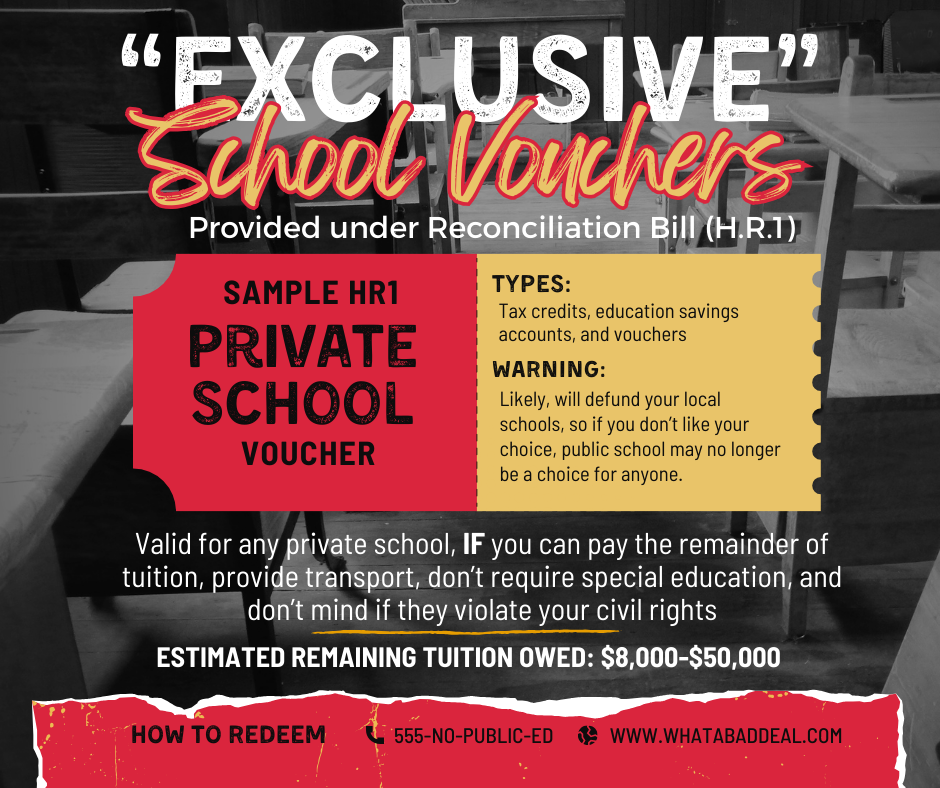Congress Just Made it Harder to Fund Public Schools
- Marianne Burke, PhD

- Jul 11, 2025
- 4 min read
Updated: Jul 17, 2025

By Passing Reconciliation Bill (H.R.1), Congress Made the Fight to Fund Public Education Even Harder
The furious battle between Democratic and Republican senators and House members ended with the passage of the reconciliation bill (H.R.1) on July 2, 2025. The bill was highly unpopular for a number of reasons, including its addition of at least $3.3 trillion to the federal deficit.
In addition to being a budget-buster, the bill includes countless provisions that harm both individuals and communities. One dangerous provision establishes a national school voucher program using tax credits converted to scholarship donations. The net result will be a drastic reduction in funding for public education. The original version of the provision was truly horrendous, making it mandatory for every state to participate in the voucher/tax credit program. Thankfully, the Senate parliamentarian forced changes to that provision, making it optional for each state. Residents in states that don’t opt in will not have access to the program.
The final provision provides a 100% tax credit for contributions up to $1,700 (joint filers $3,400) to private scholarship organizations. Those organizations can then award potentially unlimited private school scholarships to families, based on generous income guidelines. The Virginia Education Association (VEA) warns “This means students attending expensive private schools in Virginia could have potentially all of their tuition covered by these new vouchers at taxpayer expense. That could be over $50,000 for each eligible student, per year, in backdoor public funding for some elite private schools in Northern Virginia." The school choice lobby will undoubtedly be energized by these financial incentives.
There are many reasons for states to resist voucher programs. For example, this tax shelter and voucher scheme benefits wealthy families at the expense of working- and middle-class families. Diverting school funds to private schools via vouchers also starves public schools of the funds necessary to provide a high-quality education. In addition, these programs disproportionately impact rural communities, which tend to have small budgets for public schools, rely heavily on state and federal funds, and provide few private school options within commuting distance. The diversion of public school funding often leads to school closures and less educational opportunity in rural communities.
Furthermore, private schools are not required to follow the same laws as public schools. For example, private schools may use discriminatory criteria, and they may choose to avoid supporting students with disabilities. In addition, these schools are not subject to strong accountability or standards of quality. In fact, the evidence shows that switching from public to private schools does not improve students’ academic achievement.
Organizations and individuals that advocate for public education were quick to respond to the passage of the reconciliation bill. For example, Becky Pringle, the president of the National Education Association (NEA) stated:
“This budget is a direct attack on the very people our public institutions are meant to lift up. Instead of investing in our children’s education, as well as their health and their future, this law hands billions in tax breaks to the ultrawealthy—while pulling the rug out from under America’s students and families. This isn’t just a policy failure—it is a moral disgrace. Trump and congressional Republicans undermined our public schools and every student in them…. They’re not just slashing budgets—they’re taking food away from hungry children by cutting SNAP. They’re stripping health care from millions by dismantling Medicaid. This isn’t just irresponsible—it’s a complete betrayal of America’s students, families, and core values.”
Robert Kim, Executive Director of the Education Law Center (ELC), stated, “Study after study shows that vouchers sweep aside civil rights protections, support segregation, decimate public school budgets, and do not improve student outcomes. Vouchers undermine public education, the cornerstone of our democracy, and have no place in federal policy.” The ELC, through their anti-voucher campaign, Public Funds Public Schools, plans to continue to fight vouchers using every tool at their disposal.
Diverting public education funding is just one way this disastrous legislation hurts students in public schools. As Kim points out:
“Cuts to Medicaid and SNAP, the food benefits program for low-income families, will affect American students in multiple ways… hungry students have a difficult time concentrating and learning. Medicaid, for its part, funds much needed school-based health services, reimbursing schools for services provided to students with disabilities and low-income students. The loss of these critical benefits is devastating.”
What can be done?
You are not alone if you are wondering how to respond to this brazen attack on public education policies and funding. The pressure to privatize public education will only increase with the financial incentives this legislation creates. Taxpayers who are proponents of school choice will seize the chance to use this new dollar for dollar tax credit; why not direct their funds to scholarship organizations rather than Uncle Sam? Vouchers provided with tax-sheltered scholarship funds will tempt parents to abandon their local public schools. And the lure of potential profit will kindle investors’ interest in establishing new private schools, while existing institutions will increase their outreach.
Refusing to participate in this voucher scheme is critical to protecting the availability and quality of public education in Virginia; Public school advocates realize this fight just got harder In Virginia, it is the governor who decides whether or not to opt in to the program, and 2027 is the earliest opt-in opportunity.
If Virginia wants to continue its reputation as a leader in K-12 public education, it will be absolutely essential to elect the right governor in 2025; the children of our Commonwealth deserve someone firmly committed to public education, one who will refuse to sell out, even under extraordinary pressure from lobbyists and school choice proponents. These children are Virginia’s future. It falls to us to protect them and to protect their future.





Comments